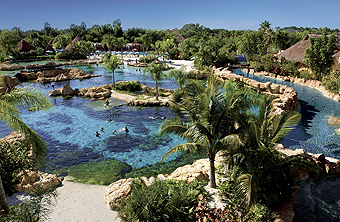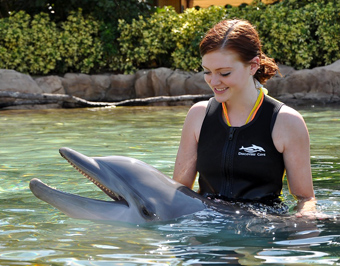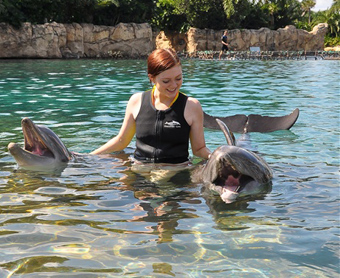LIFE
Snag That Dream Job: I wanna...be a dolphin trainer!


Gina: This was something I’ve honestly wanted to do every since I was very, very little. I actually grew up in Maine so I knew the New England aquarium in and out. And then, we moved to St. Louis, where unfortunately there’s not any ocean or anything like that, and I kind of stopped thinking about it while I was starting to go through high school. Towards the end of high school my dad actually found an article in the newspaper that was about the SeaWorld at San Antonio and their careers camp. It had the whole website, listed everything. I went on the site and actually applied and got into the camp. I did that my spring break senior year.
When I went to the camp, it just sealed the deal. You got to shadow all the different animal areas there, you got to go behind-the-scenes, kind of like you do here, but it’s a lot more in-depth at the camp. If the area you’re in is getting up at 4 o’clock in the morning, you would get up at 4 o’clock in the morning. I was elbow deep in all the fish, got to feed all the animals, and it just made it so much more real. I was like, "This is where I want to go, this is what I want to do." It renewed everything I had always talked about.
Everybody knew that I wanted to be an animal trainer, and they were like, "Oh, you’ll forget about that." But when I went through the camp, I was like. "No, this is where I’m going to end up." So I went to college in St. Pete, Fla., and I got my marine science degree. And the one thing that they did keep reiterating in the camp was, having a psychology background will help you understand how and why we train the animals the way that we do. I also got a psychology minor, and when I went home to St. Louis for several of my summers, I worked at the zoo helping out with their sea lion show, so I was trying to get some animal experience. Then my last year before I graduated, I did an internship in Cancun, Mexico where I worked with dolphins, and it was very similar to the program that we have here, so I had a little bit of hands on experience.
About two months before I graduated college I found out that Sea World was having their swim test. And I took the swim test and I passed it, passed all the interviews. Two weeks later they were like, "Oh, OK, well we’re hire you." So for two months I was driving back and forth between St. Pete, Fla. and Orlando four days a week. But at the same time I was like, "Woo hoo! I got a real job, I got what I wanted!" And I've pretty much been here ever since, and just the enthusiasm that I had from the beginning of it has never faded. I still love coming to work and being here with all the animals, and it’s just like that whole camp experience, you’re here doing everything that I’ve ever thought about or ever dreamed about doing.
GL: What is your typical day-to-day like? I know you said sometimes you’re waking up really early, and sometimes you’re up really late.
Gina: When you first come in in the morning, it doesn’t matter what time your shift is coming in, first thing you’re doing is always checking in on the animals, making sure that everybody’s where they need to be and everybody’s safe and sound. And then you start your morning by actually starting to feed the animals. So you make sure they get their first buckets in the morning, you do checks on them to make sure nobody got in any scuffles or anything like that over night.
And then usually you're setting up your day for interactions that you have. Especially during the summer, that’s usually pretty early in the morning, so you’ll be moving animals around and come out and do interactions. And just throughout the day you’re just constantly feeding them, you’re keeping them exercised, keeping them happy, with everything that you’re doing out there.
It could be bringing them out to do interactions, maybe bringing out something for them to actually play with, so your day is pretty much centered all around them and then also the interactions. And then you pretty much wrap up your day probably about 4 or 5 o’clock in the afternoon, and it’s again, feeding them one last session before they leave, and make sure you check everybody over, make sure everybody is safe and sound and then you have another shift that comes in at the end of the night that’s here with them all night long.

GL: Did you always know you wanted to work with dolphins specifically?
Gina: I wasn’t sure if it was going to be dolphins, but I knew it was going to be some sort of marine mammal. At the Maine and New England aquarium, there were always dolphins, I don’t think they had any kind of whales. But every time I came to SeaWorld, I saw the whales, and I was like oh that would be kind of cool, too. And then when I went through the camp experience, you saw everything, so then I got to see the different side, what it would be like to work with sea lions, if I ever got the opportunity to do that. I never counted out that I would work with just dolphins, I was thinking that I could potentially work with any one of them. And they all have their different personalities, the way they express themselves. So I would say not to necessarily lock yourself in to saying, "Oh I’ll just work with dolphins," because they all are very, very cool to work with.
GL: What’s your favorite part of your job?
Gina: I would say my favorite part is being here with all of the animals, but I am very much a people person, so I like to interact with the people who have never seen a dolphin before or who have never touched a dolphin. And I like to be a part of that experience when they touch a dolphin for the first time and get very, very emotional about it. But I like being here for all of the really cool stuff with all of the animals, too, with all of our pregnancies, and all of our births and our babies. I’ve actually gotten the opportunity to see a lot of our babies born here, and it’s just an amazing experience to be able to say that I was a part of that.
GL: What do you think is the most challenging part of your job?
Gina: I would say sometimes the hours or getting up in the morning. A lot of people don’t realize that you’re getting up at 4 o’clock in the morning some days. If you do have any animals that are sick, or if we have any brand-new babies, you are here around the clock watching those babies. So it’s not just a 9 to 5 job.
A lot of people think you come in at 9 a.m. and leave at 5 p.m. and that’s it. These guys are like having a bunch of little kids, you are constantly, you know, supplying care for them. So everything that you’re doing, it’s basically on their schedule, it’s not on our schedule. Where you might have been here until midnight, then you’re coming back in at 6 o’clock in the morning and you got to prepare all the fish and get everything going. There’s a little bit of a lack of sleep in there sometimes, but it’s all worth the while.
GL: Cool. What kind of advice do you have for girls who may be interested in getting into this kind of career?
Gina: I would say if they are interested in doing anything like this, to always stick with it. Don’t let anyone tell you that you can’t do it. Also, use all the resources that you have out there. Whether it’s coming to Discovery Cove for the day and just getting to see a little bit of everything by maybe doing the trainer for a day program. Or even going in-depth and doing one of the camps, that may really open up your eyes, and make you see what’s out there, what’s available, and what you can do.
Get a degree that you're interested in—not necessarily marine science or psychology. Those will definitely help you but you may not like that as you’re going through and then you don’t want to go to school anymore. So study something that you’re very, very interested in. And try to get any kind of experience—whether it’s at your local zoo, vet, or aquarium. Another route that some of our people have gone through, is they’ve gone to every possible SeaWorld camp out there, and eventually they just said, you’re too old, let’s offer you a position. That’s actually happened to several people. So try to get as much experience as you can, whether this kind of camp, or through volunteering or anything like that because that helps out in the long run.
POSTED IN How to get a job

 become a contributor
become a contributor













.png)




